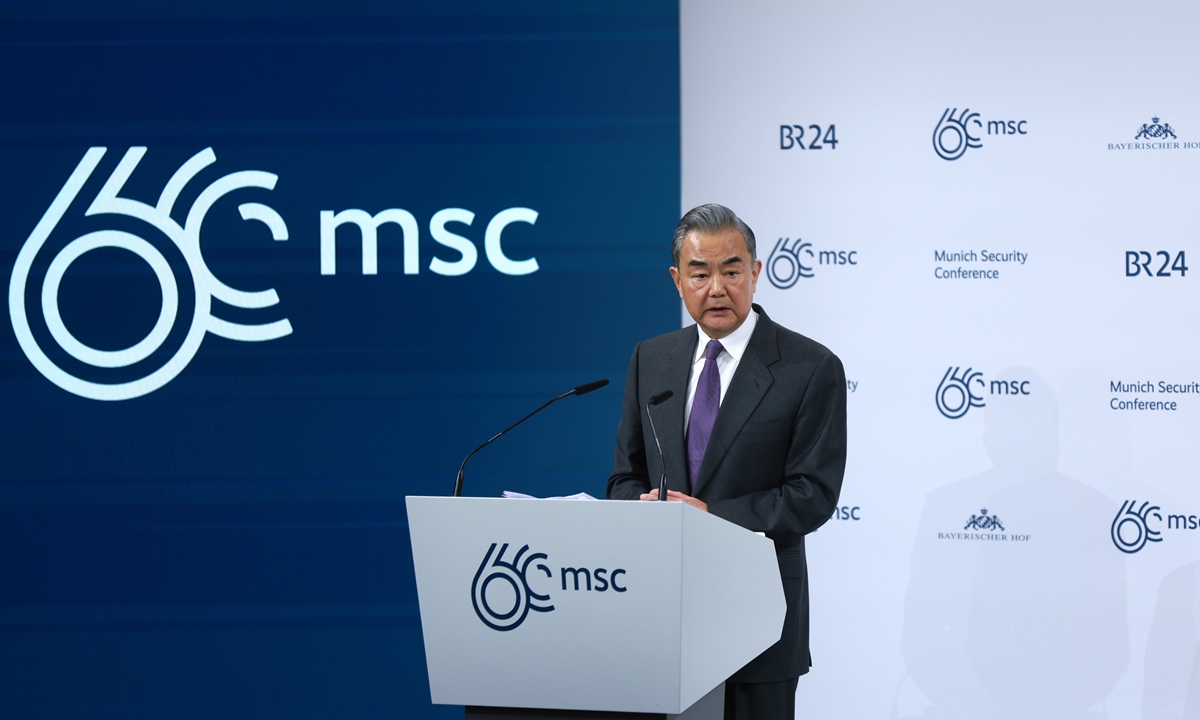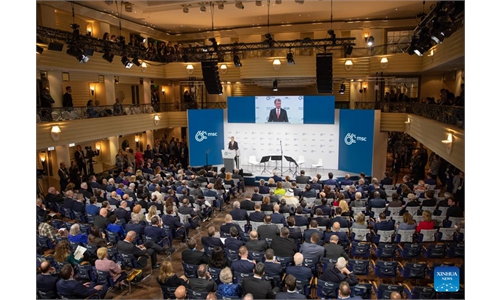
"China will always stay committed to being a force for stability in a turbulent world," says Chinese Foreign Minister Wang Yi, during his speech at the Munich Security Conference held in Munich, Germany on February 17, 2024. Photo: VCG
As a Chinese scholar, I participated in the just-concluded Munich Security Conference (MSC) for the first time. The meeting gathered about 700 representatives from more than 120 countries and regions, including about 50 heads of state. I have some feelings after having attended it.First, I noticed the bustling atmosphere on the site. I arrived one day before the opening of MSC, and participated in a sub-forum in the evening, when there were not too many people in the venue. The next day, on February 16 when the MSC started, delegates from all over the world almost filled the first floor of the hotel. Whenever a major forum was over, or before important participants were about to arrive, the hall was crowded, like a scene of the Spring Festival travel rush in China.
Second, I felt the anxiety and confusion of Europe. This was reflected in the Munich Security Report 2024. The report accurately depicts the current mentality of Europe, which, in the context of growing geopolitical tensions and economic uncertainty, believes that many countries are no longer concerned about the absolute benefits of global cooperation, but are increasingly worried that their relative gains are lower than those of other countries, which could lead to a lose-lose situation that would undermine cooperation and the current international order. It could be said that the report raises questions, yet fails to find answers.
After participating in several sessions, I found that Europe and the US are still immersed in their own sentiments. In such a multilateral forum, they were committed to highlighting solidarity, especially when it came to the Russia-Ukraine conflict. It has become politically correct for Europe and the US to remain united on this issue. During a sub-forum with a Ukrainian speaker, the audience was almost all European and American. As the Ukrainian described how to confront Russia, many in the audience applauded.
However, rather than getting excited, Europe and the US should think about how to come up with practical measures to truly promote a cease-fire.
Behind the unity of Europe and the US are the signs of growing pessimism and anxiety in Europe about the international situation. The Ukraine crisis has dealt a major blow to the long-held beliefs of the EU, and has made Europe realize that it still has to deal with the old question of "war or peace."
At the same time, unresolved economic, social, immigration and other issues within the EU have also intensified the unease. The US' strategic rivalry with China, as well as the uncertainty of the US election results, further amplifies the EU's concerns about the international situation, its own situation, and the responding strategies.
Against such a backdrop, some conference guests proposed strategies for Europe. For example, EU member states need to strengthen internal unity and cooperate and coordinate to address common challenges. Europe must also actively participate in international affairs, strengthen relations with other international organizations and partners, and jointly address global challenges.
Third, China was being paid close attention to. The attitudes toward China at the MSC were diverse. Some Europeans and Americans still view China with stereotypical ideological thinking, believing that Europe, the US, and "like-minded" partners must unite to contain China and they attribute some regional security issues to China.
However, rational and pragmatic voices toward China were also heard at the MSC. In a conference discussing Aligning Transatlantic Tech Governance, a Chinese scholar raised a question: When Europe and the US promote global governance cooperation in AI, should China be included, and if so, how should the cooperation be carried out? A participant from the US strongly opposed cooperation with China in the field of AI, emphasizing that no AI technology should be transferred to China. However, a European participant said he believed that China's involvement is indispensable in the process of promoting the global governance of AI.
This divergence reflects different attitudes toward China. Some emphasized caution and vigilance toward China, worrying that engagement with China may exacerbate competition and security risks, while others advocated dialogue and communication to promote a more open and inclusive international cooperation system. This debate showed the significance of China's participation in this forum. Only by actively and proactively voicing China's voices can the world see a more authentic image of China.
The author is a fellow and head of the US-Europe Program, Center for International Security and Strategy, Tsinghua University. opinion@globaltimes.com.cn

